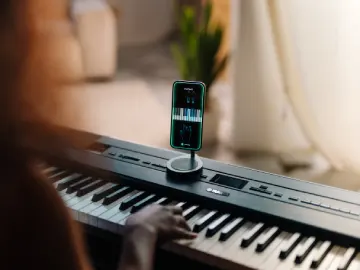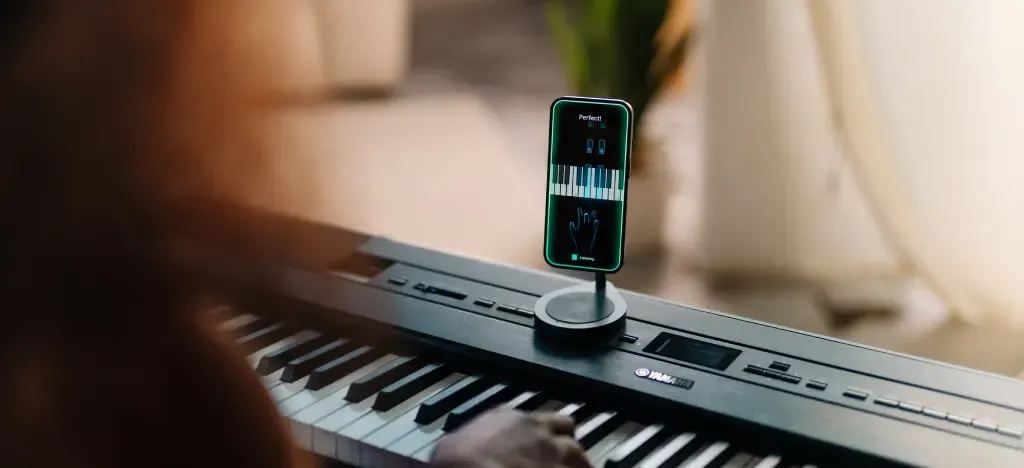Artificial Intelligence has wormed its way into just about everything — emails, photos, even the way we shop — so it was only a matter of time before it got its hands on music lessons. What’s surprising is how quickly it’s gone from a gimmick to something genuinely useful.
For decades, learning an instrument meant either shelling out for private lessons or battling with “teach yourself” books. Both had their place, but neither was cheap or particularly flexible. Now? You can open an app, play a few notes, and get instant feedback on how you’re doing. That’s a pretty big shift.
- What exactly is an AI music teacher?
- Personalised lessons that actually feel personal
- Real-time feedback: no more guessing
- Short, sharp practice
- Making music education more accessible for everyone
- Gamification — keeping you hooked
- Measuring progress
- Will AI replace real teachers?
- The best AI teacher in 2025
- FAQs: AI music teaching
What exactly is an AI music teacher?
Strip away the hype and it’s simple enough: an AI music teacher is software that listens, analyses, and responds. Play a wrong note, it tells you. Slip out of time, it nudges you back. Struggle with finger strength, and it throws in an exercise to build it up.
It doesn’t get bored, it doesn’t watch the clock, and it doesn’t care if you practise at 2 AM in your pyjamas. For beginners especially, that sort of immediacy can be gold — you get corrections before bad habits take root.
💡ARTMASTER TIP: Want to dive deeper into how AI is reshaping music learning and creativity? Check out our full guide to AI music tools — including apps for songwriting, production, instrument learning, and more.
Personalised lessons that actually feel personal
Anyone who’s ever sat through a generic class book will know the frustration: endless “Mary Had a Little Lamb” when all you wanted was to bash out Oasis. AI at least tries to meet you where you are.
From the first session, it can ask what you’re into and what you want to achieve. Fancy playing your favourite pop tune? It’ll steer you there. Need to fix clumsy left-hand technique? It’ll drill down on that instead. It’s closer to having a personal trainer than a traditional syllabus.
💡ARTMASTER TIP: Get inspired with 40 iconic piano intros — perfect starting points for personalised practice with Artie.
Real-time feedback: no more guessing
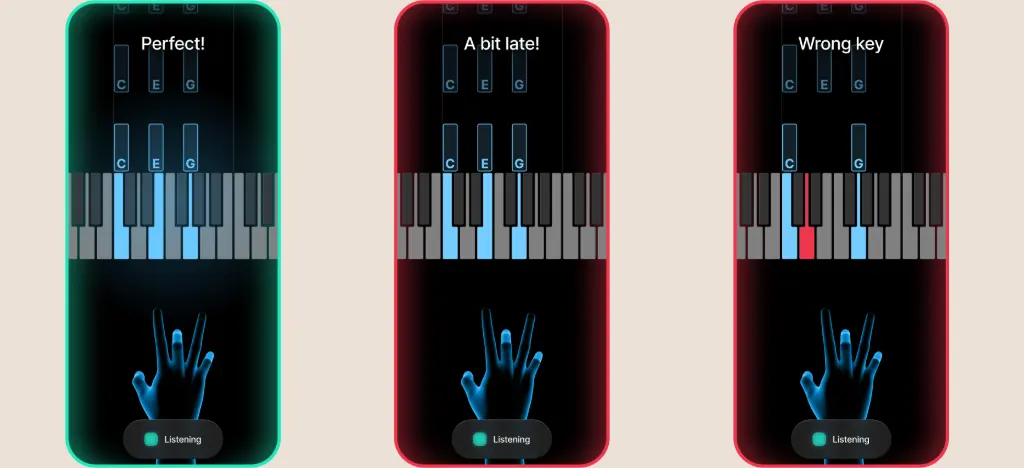 One of the hardest parts of learning an instrument is not knowing whether you’re doing it right. You can bash away for days and only discover in your next lesson that you’ve been playing the rhythm wrong all along.
One of the hardest parts of learning an instrument is not knowing whether you’re doing it right. You can bash away for days and only discover in your next lesson that you’ve been playing the rhythm wrong all along.
AI removes that lag. It listens and corrects instantly. Think of it as the musical equivalent of autocorrect — annoying at times, yes, but undeniably useful when you’re starting out.
💡ARTMASTER TIP: Want to see how Artie compares to other apps? Check out our in-depth review of the best piano learning apps — we tested them all so you don’t have to.
Short, sharp practice
Can you really make progress in just 10 minutes a day?
Yes. Here’s a myth: you need hours of practice to improve. The truth? Ten focused minutes usually beat an unfocused hour. AI makes that easier by building sessions to suit the time you’ve got.
A five-minute warm-up before work, a focused drill in the evening, a longer deep-dive at the weekend — it all counts, and the AI adjusts accordingly. No more wasting time on irrelevant exercises.
💡 ARTMASTER TIP: Want to make the most of short practice time? Read how to learn piano fast — packed with practical tips for busy adults who still want real progress. And find out how to get the most out of your practice sessions with our guide — The art of effective music practice.
Making music education more accessible for everyone
 Music lessons have always had gatekeepers: geography, money, and availability. Not everyone has a decent teacher nearby, and even if you do, it’s not always affordable. AI isn’t free, but it’s a fraction of the price of weekly one-to-ones.
Music lessons have always had gatekeepers: geography, money, and availability. Not everyone has a decent teacher nearby, and even if you do, it’s not always affordable. AI isn’t free, but it’s a fraction of the price of weekly one-to-ones.
The tech also doesn’t care where you live. As long as you’ve got a half-decent phone or tablet, you can start. Add the fact that AI tools can easily adapt to different languages, and you can see why this suddenly feels a lot more accessible than the old model.
💡ARTMASTER TIP: We all know the power of music to move us. But recent studies reveal that actively playing a musical instrument can significantly enhance your cognitive abilities, mental health, and even physical well-being.
Gamification — keeping you hooked
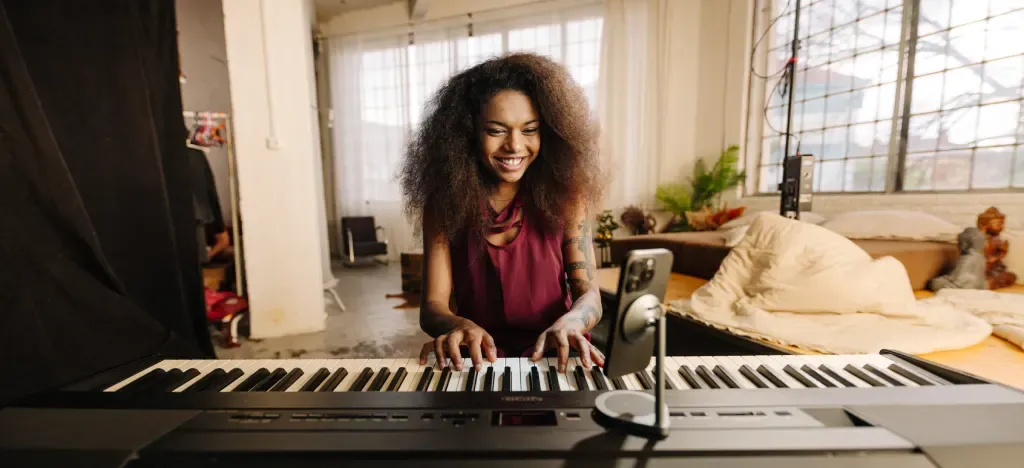 Scales and arpeggios aren’t exactly the stuff of dreams. That’s why most AI music apps lean on gamification: streaks, badges, little dopamine hits to keep you coming back.
Scales and arpeggios aren’t exactly the stuff of dreams. That’s why most AI music apps lean on gamification: streaks, badges, little dopamine hits to keep you coming back.
It’s not revolutionary — video games have been doing it for decades — but it does the job. The point is consistency, and if unlocking a “Level Up” badge gets you back to the keys tomorrow, then fine.
Measuring progress
![]() Old-school practice meant relying on your teacher’s memory or a battered notebook. AI can chart your accuracy, timing, and improvement in far more detail.
Old-school practice meant relying on your teacher’s memory or a battered notebook. AI can chart your accuracy, timing, and improvement in far more detail.
For the student, it’s motivating to see actual numbers creeping up. For the teacher (if you still have one), it’s a handy diagnostic tool.
💡ARTMASTER TIP: Once you can track your progress, it’s easier to improve deliberately — so try these 10 advanced piano tips to transform your playing.
Will AI replace real teachers?
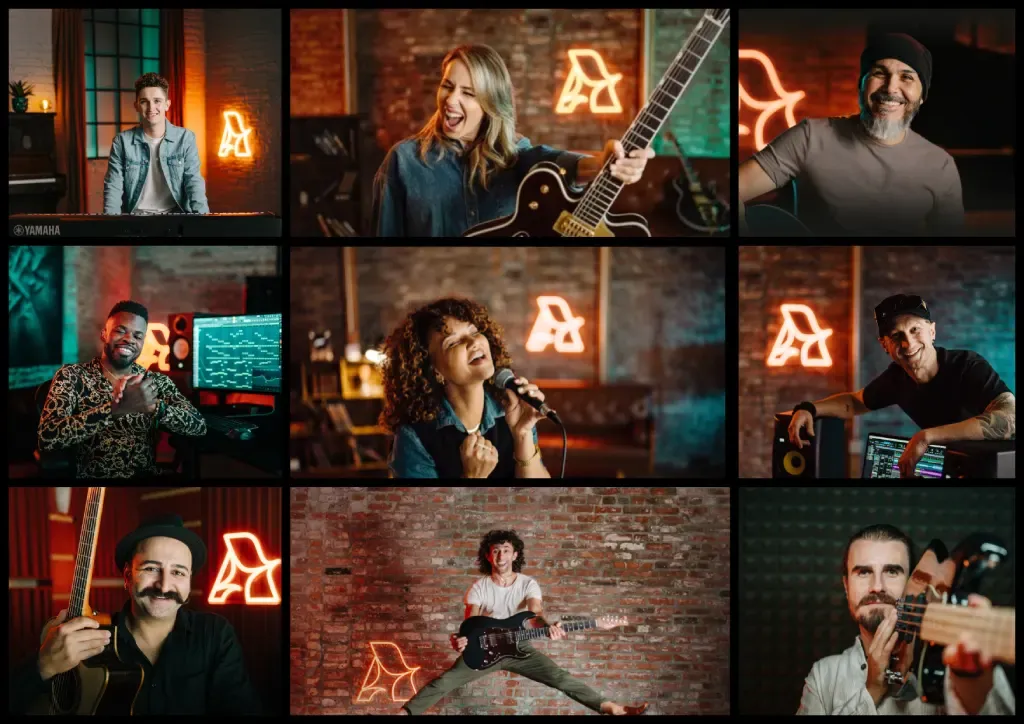 No. And honestly, it shouldn’t.
No. And honestly, it shouldn’t.
What AI does brilliantly is the grunt work: repetition, drills, technical corrections. What it doesn’t do well is the artistry. A human teacher can show you how to phrase a line, how to feel the weight of a piece, how to bring out emotion. That blend of discipline and expression is still uniquely human.
The likely future is a hybrid: AI for practice, humans for performance.
💡ARTMASTER TIP: If you want to experience what it's like to learn from some of the best music teachers in the industry, sign up for our 7-day free trial.
The best AI teacher in 2025
Plenty of tools are trying their hand at this, but one in particular has been making noise: Artie.
Artie bills itself as the world’s first dedicated AI piano teacher. Unlike apps that just show you videos or light up falling blocks, it actually listens to your playing, talks back, and adapts in real time. Beginners get to play songs from day one, while more experienced players get drills and feedback tuned to their level.
It’s not here to replace teachers — but as a practice partner, motivator, and 24/7 coach, it’s the most convincing version of AI music learning we’ve seen so far.
👉 Curious? Download Artie for free today!
FAQs: AI music teaching
Can I really learn piano with AI?
Absolutely. Artie listens to your playing, corrects mistakes in real time, and adjusts your lessons as you go — just like a real teacher would.
How does an AI music teacher like Artie work?
Artie uses your device’s microphone to hear what you play. It then gives spoken feedback on rhythm, technique, and dynamics, and adapts future exercises based on your performance.
Is AI music learning good for beginners?
Yes — especially. Beginners benefit from the step-by-step guidance, instant corrections, and flexible practice sessions that AI tools provide.
What makes Artie different from other piano learning apps?
Most apps are pre-recorded or one-size-fits-all. Artie listens to you, gives feedback like a real teacher, and adjusts your practice plan in real time.
Will AI replace human music teachers?
No — AI supports your learning between lessons. It’s great for practice, drills, and motivation, while human teachers still bring creative insight and live interaction.
How much does Artie cost?
Artie will launch with a free trial. After that, you can expect pricing around $7.90/month — making it one of the most affordable ways to learn piano.
About the author
Matt Ford is a musician, teacher, writer, and lifelong student of sound.
With years of experience in both performing and teaching, he shares practical advice through ArtMaster to help musicians at every level build skill and confidence in their playing.
